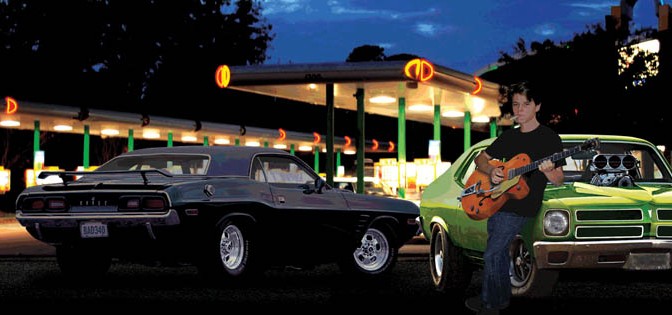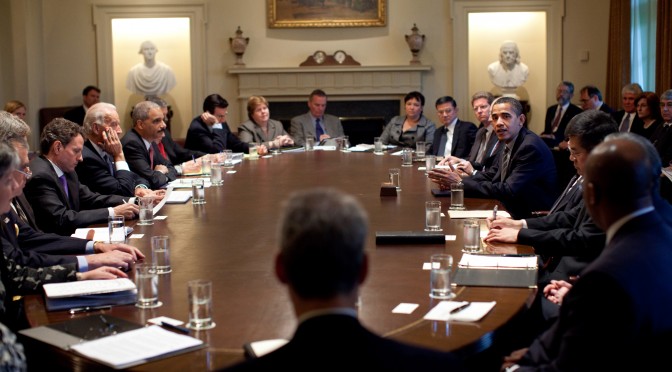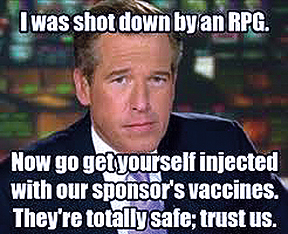Jennifer Scarred Wolf was an early riser. Joshua Rennenkampf was not.
By the time Josh got up and dressed, her bed was made and she was nowhere to be found in the house. Josh peeked out the window and saw her Jeep was still there, so he figured she was out taking a walk or picking flowers or some of that other girly stuff she liked to do. It was one of the things he loved about her, come to think of it: she was so easy to please, even just nature made her happy.
Another thing he loved about her was that she didn’t watch much TV. When she did, it was usually the Weather Channel. She’d sit and watch it like it was a fascinating interview or something.
Josh booted up his work station in the living room. He still had work to do on a couple of his contracts, but decided to get started on Tommy’s request instead. This was the weekend, after all.
He had lost track of time when Jennifer came inside, shedding her jacket.
“Good morning,” she greeted, cheerily. “Brrr. It’s nippy up here in the mornings.”
“Morning,” he replied, taking a sip of coffee.
She pressed her small, cold hands against the back of his neck and he jumped at the icy sensation.
“Told you it was nippy,” she said, laughing.
“You’re such a brat in the mornings,” he said, finding her cheer contagious despite himself. “Jeez, it’s not that cold outside, but your hands are like icicles.”
“Cold hands, warm heart,” she sing-songed, sweetly.
“Where were you?”
“Oh, I played with the dogs a little,” she said. “Brushed Indy down. I had to do something while you were sleeping your life away. I’ll go make breakfast in a minute.”
“Sounds good,” he said, rubbing her hands in between his to warm them.
She sat in his lap and glanced at the monitor. “What’s ‘MK Ultra’?”
“Just one of the rabbit trails I followed, checking into something for your uncle.”
Her expression turned thoughtful as she skimmed over some of the text on screen. “Monarch… Montauk… What is all this?”
Josh alt-tabbed to another window. “Oh, just some conspiracy stuff you probably don’t want to hear about.”
“Ah,” she said, poking him in a ticklish spot. “Trying to find out whether I’m real or a lizard-person?”
“Oh, I know you’re reptillian,” he deadpanned. “Your hands just gave it away, you two-legged iguana.”
She frowned, started to speak a couple times, then hesitantly said, “I’ve been meaning to ask you something.”
Josh sobered in an instant. He dreaded “the Talk,” but knew, sooner or later, they were going to have it. Was now the time? They’d already had a couple Big Talks recently—surely he had earned a postponement?
They had the Religion Talk, wherein he had assured her he had no problem with her faith. He believed in God; just didn’t know much about Him and never made an effort to know. He’d never read the Bible before meeting her, and still wasn’t very keen on it, or going to church. But he suspected there was something to Christianity, or the pinkos wouldn’t be so rabid in their efforts to smear it.
They had the Political Talk, wherein she acknowledged the Hegelian patterns he pointed out in economic and foreign policy over the last century; conceding it might be plausible that people in authority could conspire to frame their enemies and kill innocents just to accumulate more power for themselves and push an agenda that couldn’t achieve popular support otherwise. She just didn’t like to dwell on it, and he could certainly understand that.
The Talk that was still forthcoming was about their future together–if there was to be one.
“I’ve been thinking about how my dad and Uncle Tommy were framed for that murder in Indonesia,” Jennifer said.
Relief flooded through Josh’s brain, despite the sobering subject of her murdered father. “Yeah?”
“Uncle Tommy thought it must be because of what they were investigating before they left. He couldn’t think of anything else it could be.”
…
(from Chapter 25)
…
The dogs began barking outside, then he heard a droning noise—an engine straining to pull a vehicle uphill on his private drive from the highway below. He changed seats and cued up his security camera feed. He toggled between the cameras and saw a subcompact creeping up his drive. There appeared to be only one person inside but he couldn’t tell who it was.
He strapped on the shoulder rig for his sidearm, pulled his jacket over it, and yanked his Mini-14 off the rack before heading outside. He drifted into the woods to the back of his parking area, and took position at a hide which gave him a good view of the drive and parking area, while concealing him fairly well.
When the subcompact pulled up and stopped, he recognized Paul Tareen’s daughter, Terry. She remained inside her car, though, staring warily at the two large pit bulls standing stiff-legged on either side of the car, watching her.
Josh broke from cover and strode toward the car, telling the dogs to stand down. Ragnarok and Valkyrie ran back to join him, then matched his pace, one on each flank. He had really hit the jackpot with these dogs. They responded to command very well with minimal training.
Seeing Josh, Terry got out of the car with a dimpled smile and a casserole pot. “Howdy, neighbor!” she called.
Josh slung the rifle around his back and said, “Hey, Terry. Never seen anyone in your family drive a car before. Thought you did everything on horseback.”
She laughed and lifted up the ceramic casserole pot. “I couldn’t figure out how to carry this on a horse.”
When he reached her, he extended his hand to shake. She hugged him instead. It was a brief contact, but the message was received: she was interested in being more than a handshake kind of neighbor.
“What’s that?” he asked, gesturing toward the dish.
“I made apple cobbler,” she said, cheerily. “We couldn’t finish all of it, so I thought you might like to, before it goes bad.”
“Well thanks,” he said. “That’s real nice of you.”
“You’re welcome,” she said, beaming. He felt guilty that this young, possibly innocent girl was so sprung for him.
“Well, come on inside,” he said, waving toward his house. “Might as well visit a spell, since you took the trouble to drive over.”
He led her inside. She asked polite questions and made polite comments about his dome home while looking around like a bumpkin in New York City.
Josh retrieved bowls and spoons from the kitchen. “Why don’t you have some with me?”
“I guess I’ll have a little bit,” Terry said, grinning again.
She was a pretty girl, with a natural willowy figure, and more feminine than most of her generation. Her rustic upbringing by a gruff father and no-nonsense mother had gifted her with manners and a degree of humility despite her youthful confidence.
Maybe marriage could live up to the hype with a woman like this. He hoped she would find a man who appreciated what she brought to the table, and not some abusive jerk, alcoholic, or deadbeat.
They chatted as they ate the cobbler at his small table, and he again felt a pang of guilt about her attraction to him.
“Just out of curiosity,” he asked, “does your family know you came over here?”
She nodded. “Yeah, why?”
“And they’re okay with it?”
She laughed. “They’re pretty sure you’re not a serial killer, or we wouldn’t have had you over for Independence Day.”
“How do I know you’re not a serial killer?” he asked.
She laughed some more. “Don’t ever make me mad, or you might find out.”
After a couple glances into his eyes, she said “Y’know, it’s going to be dark soon. Do you think you can show me how to navigate by the stars?”
By country girl standards, Terry was coming at him with all guns blazing.
He had given her family a copy of the Ranger’s Handbook, from which they could learn as much about using the stars as he could teach her. On the 4th of July at their house he had shown her family the basics of land navigation with a compass. He also answered a lot of questions about communications and military tactics, and discussed with Paul teaching them some more skills in the future. They ate a big meal cooked by Terry and her mother, and watched American Sniper on the flat screen, too.
“There’s not all that much to it,” he said, “but that’s fine.”
What cobbler they didn’t finish went into a plastic container, which he stored in the fridge. Terry asked if she could wash the casserole pot and lid in his sink, and volunteered to wash the other dishes, too. He gladly consented, and they continued to chat as she did.
She slyly worked in a few probing questions about Jennifer. Josh answered honestly that he wasn’t sure whether they would stay together, or even if they were still officially together right then. He wasn’t seeing anyone else, and didn’t think Jennifer was, but who could tell, regarding such things?
By the time Terry finished the dishes it was getting dark. They went outside and played with the dogs until it was dark enough to see the constellations clearly. He pointed out what she should be able to see on any clear night in the northern hemisphere, and how to judge direction by their position. The most important object to find was Polaris, the North Star, which was easily done after locating the Big Dipper.
As he pointed things out, she closed the distance until she was backed up against him. Her body language suggested that he should wrap her in his own body heat to fend off the cool evening air. Josh hadn’t always been a hermit, so he knew what was going on. And the pleasance of her proximity was overcoming the guilt he’d felt earlier. She was only a few years younger than Jennifer, after all…
Their age difference didn’t seem like such a big deal anymore. It was only thoughts of Jennifer that allowed him to keep his hands off Terry.
He said he had work to do, and sent her home. She bid goodbye with a smile that promised she would test his resolve again soon.
Despite himself, it was hard to concentrate on work that night. He went to bed with the idea that it really sucked being alone sometimes, and only then realized that Terry had been the victor in their friendly hormonal struggle.
The next night Josh finished the cobbler, and Jennifer called as he did. When she asked what he was doing he naively answered honestly, and the conversation quickly became an interrogation. Before it was finished, Jennifer found out where the cobbler came from, who delivered it, what happened afterwards and how long Terry visited that night. Having shown what he thought was respectable restraint, Josh answered her questions honestly, but was on the verge of telling her to mind her own business more than once.
Instead, he went the playful route and took every opportunity to crack jokes and poke fun.
He was tired of being in sexual limbo. He had been content with going Galt before meeting Jennifer, including the whole celibacy aspect. But she had awakened hungers in him which went unresolved for an extended period, and it was kind of satisfying making her squirm for a change.
Instead of getting pissy and hanging up in a huff, though, Jennifer said, “I’d like to come visit again this weekend.”
Jennifer drove up Friday. She had an interview at a law office in town before coming to his house. He avoided obvious questions like, “Why do you want a job here when you live in Oklahoma?”
He suspected any such question would trigger an ambush she had planned, to instigate the Talk.
But he knew the Talk was inevitable, and probably this weekend, so he instigated it himself when they put Denver and Indy back in the stables after a ride.
It was time to let the other shoe drop. Maybe she would take the deal he was willing to offer. If so, great. More likely, she wouldn’t. She could get on with her life and find the perfect supplicating church boy to marry, if that’s what she wanted. Josh could go back to being a hermit, or have some fun with Terry once he got over Jennifer…or whatever. He just wanted to know, and cut his losses if it wasn’t going to work out.
The Talk took them through the evening chores, back into the house, and finished on the couch.
“You’ve got expectations, right?” he asked, after they’d gone over the love motive extensively. She’d been claiming to be in love with him ever since Indonesia.
“Expectations?” she repeated. “What do you mean?”
He sighed, uncomfortable with these touchy-feely conversations about relationships and other daytime TV fodder. “I mean you want to get married. You’ve made that pretty obvious. So you must have certain expectations about how it’s going to be. What do you expect a husband to bring to the table?”
“You make me sound so demanding,” she said.
“I’ve got expectations,” he said, shrugging.
“Like what?”
“Fine, Jennifer: I’ll go first: Outside of war, nuclear attack, or natural disaster, I’m not moving anywhere.”
She almost smiled. “I wouldn’t dream of asking you to leave this place.”
Jennifer didn’t like the cold, but she loved snow. When she visited he would often wake up to find her drinking a cup of coffee just staring out the window at the scenery, bundled up in blankets like an Eskimo even though it was warm in his house.
“Okay, good,” he said. “But I’m the king of this castle. I have the last say and the bottom line on decisions, and I expect you to back me up, even if you disagree with me.”
She flinched. “You expect me to just keep my mouth shut and do as I’m told?”
“I said king; not tyrant,” he replied. “We can talk about stuff. You can tell me what you think. If I see you’re right about something, then fine—we’ll go with that. But if I listen to all your reasons and still decide on something else, you need to let it drop and not pitch a fit.”
“That’s not really fair,” she said. “You could refuse to admit I’m right, and stick with your decision just to be stubborn.”
He shrugged again. “If you can’t trust me, then you got no business marrying me.”
She mulled this over for a while. “I guess I’m not really against you being king of the castle. But I would expect to be queen.”
“I have no problem with that,” he said. “Just don’t start thinking we’re on a chess board.”
“What else?” she asked, warily.
He hadn’t expected to get past that one. He had been sure she would storm out calling him a sexist pig and plenty other names. Still, she hadn’t explicitly agreed to the term, either. He decided not to press her on it right now, because he had plenty more he was sure would bring her claws out.
“I’m not gonna tolerate disrespect from you,” he said. “I don’t care how mad at me you are, or if you’ve had a bad day, or if I’ve done something really stupid. If you’re my wife, then you give me respect, period. You can disagree with me or whatever without disrespecting me.”
She nodded. Well, that was easier than expected, too.
“You have to put up with my lunacy, ” he said. “Because I’ll probably never change. My worldview isn’t going to change; I’m not giving up my guns; I’m not going to get a national I.D. if it becomes mandatory; I’m not getting kitchen appliances with microchips for the smart grid; I’m not going to register or get permits for anything I already have a right to.”
“I’ve never called you a lunatic, Joshua. I just get scared sometimes because you dwell on gloom and doom stuff so much. I think I ought to get a gun of my own. Something like what Uncle Tommy has, but maybe doesn’t kick as hard.”
At that point Josh’s goal began to transform from scaring Jennifer away as fast and decisively as possible, to seeing if there was actually a glimmer of hope they could be together long-term.
“My rule about cellphones stands,” he added. “And anything else that can be used to spy on me. That’s a deal-breaker.”
This was it. No woman on Earth, once aware of cellular technology and social networks, would ever give them up. They would die first.
She sighed. “I know. What else?”
His jaw dropped. “Do you mean you agree?”
She nodded, frowning. “I’ll go along with that. But there’s got to be some kind of compromise we can both live with. For now: okay. Anything else?”
“W-well,” he stammered, still off balance, “you’re not allowed to kick me when I’m down.”
“Okay.”
He scratched his head. This had gone completely different than he had imagined. Normally he would suspect she was lying just to trap him, but she had proven honest to a fault so far. “I want sex,” he said.
“That’s part of marriage,” she said, with a reserved laugh.
“Well,” he licked dry lips, feeling awkward about all this, “I want it often, and I want…you know, passion. You can’t just lay there like you’re bored or being traumatized.”
“I don’t think I would be like that,” she said.
“You can’t be claiming headaches all the time, or you don’t ‘feel sexy,’ or other excuses.”
“What if I’m sick?” she asked, with an indignant sharpening of tone. “I’m still expected to…?”
“No, no,” he interrupted, shaking his head. “Legitimate reasons are one thing. But you can’t use sex as a weapon. It’s not a training tool for you to withhold as punishment or give as a reward. It’s just something we do. And if you’re not gonna enjoy it…if you’re not gonna give it a good ol’ college try, then I really don’t want to go through the trouble. What’s the point of us sharing a bed?”
Jennifer chewed on her lip for a moment, then said, “I’ve got some expectations, if you’re done.”
“I think those are the big ones,” he said, feeling dazed. “If we can agree on those, we can work out the rest.”
“Okay,” she said. “If I’m going to be your wife, then we have to find a good church somewhere around here, and I expect you to go with me.”
This was no surprise. “I can do that. Sundays and Wednesdays?”
“Probably,” she said. “We can take a day off now and then. But we might get invited to extra things I want to go to.”
“I’d be willing to do that,” he said.
She looked relieved. “Also, I’d like you to keep an open mind about it.”
“About Christianity?” he asked.
She nodded. “Just give it the benefit of honest consideration, the way you’ve done with other things you believe.”
He shrugged. It seemed like a fair compromise.
“And I would raise our kids to believe in God,” she added quickly. “To read the Bible, and believe what’s in it.”
“You can’t force people to believe something, Jennifer. I’m living proof of that.”
“That’s not what I’m saying,” she said, putting her hand on his. “I’m saying I’m going to teach my kids the truth as I see it. When they get old enough, they’ll make up their own minds just like we do. But they’ll at least have the benefit of the option.”
“I’ll go along with that,” he said.
“You won’t try to contradict what I teach them?”
“No, but while we’re on the subject of kids…”
“Hold that thought, please,” she said, pointing an index finger in the air. “We’ll get to that in a minute.”
“Okay,” he said. “Go for it.”
“I won’t tolerate abuse,” she said. “That’s a deal breaker for me.”
“That’s no prob…wait a minute. Define ‘abuse.’ Does it include when you don’t get your way, or you don’t like something I say?”
“You can’t hit me,” she clarified. “Ever. Or choke me or…manhandle me…”
He waved his hands and shook his head. “Physical rough stuff. I wouldn’t ever do that to you.”
“But just like you don’t want to be disrespected,” she added, “you can’t be verbally abusive, either.”
“What’s verbal abuse? Define that.”
“I’m not talking about arguments…”
“You mean sarcasm?” he asked. “Because I use sarcasm all the time, even when I’m not upset.”
“Sometimes,” she said, twisting her lips as if searching for the right words. “Any kind of character assassination directed at me. Anything meant to demean or defame or belittle me.”
“Okay.”
“I expect faithfulness,” she said. “If you’re my husband, there can’t be any other woman.”
“Give me sex on a regular basis and I won’t want any other women,” he said, a bit defensive.
“Joshua, I’m serious. I can’t tell you how serious I am about this.”
He squeezed her hand. “Same thing on the flip side, though. You have to be faithful, too. No exceptions, no excuses.”
“You don’t have to worry about that,” she said. “Believe me: I’ve had opportunities.”
“I’m on board. But it’s a two-way street.”
“And just for the record,” she said. “Once I’m married, I plan to give my husband all the sex he can handle.”
Josh said nothing, but his mind sure was noisy right then.
“I’d like to have three children,” she continued. “Maybe more.”
“Hmm. Who decides if more and how many more?” Josh asked.
“Something we’d have to agree on. Would you give me at least three?”
Josh thought about it. “Yeah. But what if I decided no more, and you still wanted more?”
She took a deep breath. “If I couldn’t convince you, then I guess I’d have to respect your wishes.”
He couldn’t believe how this was going.
“But we can’t argue in front of the kids,” she said. “We have to work out disagreements in private, and present a united front to the family.”
“Fair enough,” Josh said. “And you can teach them Bible stuff, but I’m gonna teach them to shoot, hunt, trap and prep.”
She seemed to look a little less worried the further along the conversation went.
“I know you love your privacy,” she said, “but I want to be able to have family over.”
“Tommy and Linda are welcome here any time,” Josh said, with a magnanimous gesture. “Same with Gunther and Carl. And Uncle Jay for that matter. I’m just not so sure about Takoda, though.”
“Me neither, right now,” Jennifer said. “But what about my mother?”
“If she minds her manners, we can do that.”
And we should go there to visit them sometimes, too,” Jennifer said. “And you’ll have to be sociable.”
“Life of the party—that’s me.”
“And I’ll work as a legal assistant; or at whatever job I can find, if you want me to,” she continued. “But when we have our first baby, I’m done. I stay home and raise our children after that.”
“You mean you don’t want to build a career first, and wait until your 30s to start popping them out?”
She shook her head.
He was stunned. He knew Jennifer marched to a different drum, but had no idea she was this divergent from the feminist norm. “Well…how soon do you want to start popping them out?”
“We can spend a year or two just enjoying each other,” she said. “But I don’t want to wait any longer than that.”
“Done. And you don’t have to get a job at all if you don’t want, baby or not. I make enough consulting to keep the bills paid here.”
She cracked a smile. “Done? Does that mean my terms sound acceptable?”
They did. In fact, he was getting excited. Truth be told, she had him at “all the sex you can handle.”
With the big concerns dealt with, they moved on to smaller stuff. He felt even better about the whole thing when he found out she didn’t want some huge dog-and-pony show of a ceremony. It seemed she understood that the marriage would be more important than the wedding.
As the exchange of terms lightened up and wound down, she snickered a little and said, “You know, I guess you could say what we’re both insisting on is an old pre-war, maybe even Puritan, marriage.”
“Welcome to the new frontier,” he quipped, kissing her hand. “The new counter-culture.”
“Well, except for your doomsday prepping, anyway,” she said.
Josh snapped his fingers. “Hey, wait right there. I got something for you.”
He left her on the couch, went back into his workshop, found what he wanted on the bench next to the soldering iron, and returned to the living room with the customized phone.
“I was saving this for your birthday, but it’s ready now.” He handed it to her and she stared curiously at it. “I modified it. It’s safe to use here at the house or wherever. And you don’t need a warranty plan from the carrier. If it breaks, I’ll fix it.”
She turned it on, eyes lighting up before the screen did. “Does it have Internet?”
“Of course,” he said, laughing. “It’s rooted. You get not only wi-fi but 4G, free. Texting. A few aps. But you can’t trust all the aps out there, so you have to check with me before you download anything.”
She threw her arms around him and squeezed with surprising strength for her size.
He slapped her on the thigh and stood. “Go get dressed up.”
“What?” she asked, tearing her gaze away from the phone to look at him. “Why?”
“I’m taking you to a restaurant in town,” he replied. “There’s a question I want to ask you there.”
…
(from Chapter 30 of False Flag)
Chapter 1
Chapter 2
Chapter 3
Chapter 4
Chapter 5
Chapter 6
Chapter 7
Chapter 8
Chapter 9
Chapter 10
Chapter 11
Chapter 12
Chapter 13
Chapter 14
Chapter 15
Chapter 16
On Saturday July 30 2016 all the novels from the Retreads Series are on sale at Amazon for 99 cents.







